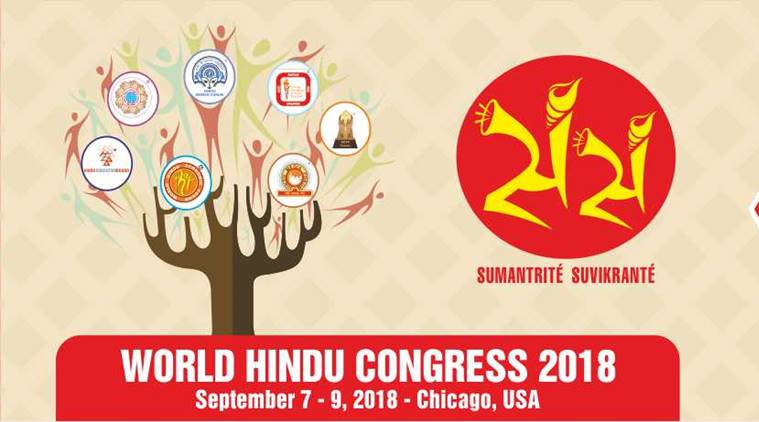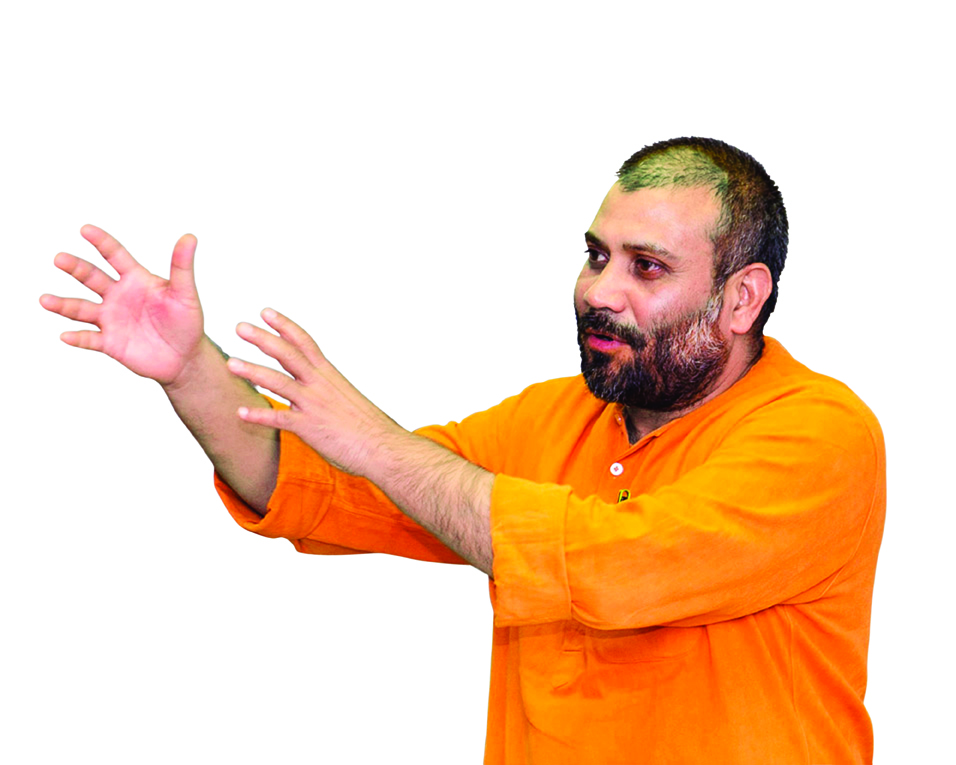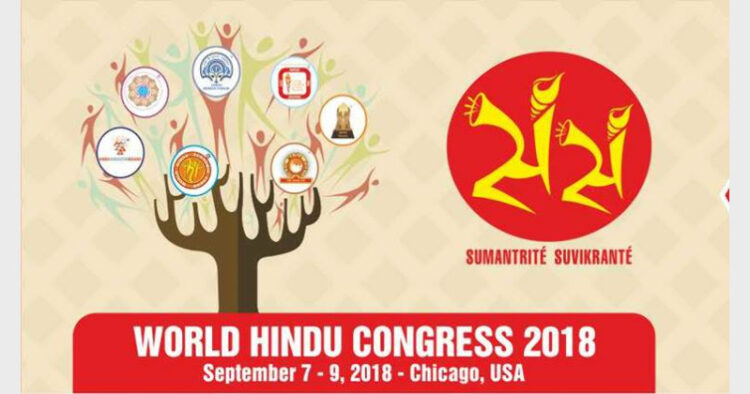The preparations for second World Hindu Congress to be organised in Chicago from September 7 to 9 are in full swing. About 2000 delegates from across the world will join the mega event being held on the eve of 125th anniversary of Swami Vivekananda’s historic address to the Parliament of World Religions. Organiser Chief News Coordinator Dr Pramod Kumar spoke to Swami Vigyananand, joint general secretary of Vishwa Hindu Parishad and the main brain behind the event, in New Delhi to know the key idea behind the Congress.

- Second World Hindu Congress in Chicago from September 7 to 9 on the eve of 125th anniversary of Swami Vivekananda’s historic address to the Parliament of World Religions
- Around 2000 delegates from across the world to join
- 200 speakers to address parallel sesions discussing different themes
What is the main idea behind the organisation of the World Hindu Congress (WHC)?
See, if a society has to progress and get respected in the world, it has to focus on five key areas—economy, education, media, politics and youth. In the WHC, we have added two more areas—temple organisations and women. These are seven pillars of the WHC, for which there independent organisations are active—World Hindu Economic Forum (economy), Hindu Education Board (education), Media Forum (media), World Hindu Democratic Forum (politics), Hindu Students and Youth Network (Youth), Hindu Women Forum (women) and Hindu Organisations of Temple & Association (social). The WHC is a global platform for Hindus to connect, share ideas, inspire one another and impact the common good.

What is the focus in World Hindu Economic Forum?
The World Hindu Economic Forum organises national and international conferences across the world with the focus to make the Hindu society prosper. Since market access is must for any society to progress in business, our focus is global market. We focus how a middle scale businessman can access global market, set up industries, have partnership, etc. Our focus is now Africa. Today Africa is what Bharat was 50 years ago. Indians live there for over a hundred years, but for the last three decades China has tried to capture mines, infrastructure like road, highways, ports, railways, etc there. Manufacturing, agriculture, education, service industries are still not populated. We have started regional conferences for it. We are also working to develop an eco system in the Hindu business community for affordable capital, technology and human resource.
What do you want to convey through the Hindu Education Board?
I generally say, Bharat Mata was liberated in 1947 in spite of the Partition. During Green Revolution in 1965, Dharati Mata was liberated. During liberalisation Lakshmi Mata was liberated. But Saraswati Mata is still captive in the hands of bureaucrats. We have to liberate Her. We are the country with more than one billion population. But we do not have enough higher education infrastructure. See the amount of students going outside Bharat for higher studies in the US, Canada, Australia, etc. About 18 years back Mashelkar Committee had said that with the amount that is going outside Bharat to pay fees for higher education annually we can build 20 to 30 IITs and 30-40 IIMs annually. This is the area which we focus in the Hindu Education Board. For it, we first need positive government policy framework. We still do not have proper system of faculty training. Campus environment is also very important. See what happened in the universities like JNU, etc. Policy framework, governance, faculty training, campus environment and curriculum are our areas of focus.
What is the focus in Media?
It needs no elaboration that one who controls the communication, controls the whole world. We the Hindus have ignored this fact. Media is not just print and TV, entertainment too has an effective role. How to make inroads into the entertainment media and how to change the narrative is necessary. We also need to think in advance how technology is going to be shaped in coming days.
What about politics?
The Hindus are in good number in many countries, but they do not focus on politics. Politics dominates the discourse. We have to be part of the decision making process. So, we are encouraging young people to join politics in the countries they live. In many countries, young people have started joining politics. One of our workers has become Vice President of a country recently. One person has become Minister of Human Resource Development in Malaysia.
What is done for promoting the involvement of youth and women?
We train them in the areas like education, politics, media, economy, etc. Those days are gone when women were not literate. Now they are capable and knowledgeable. But the discourse in our country on women issues is dominated by the Marxists or the Big Bindi Brigade. It is because we have not encouraged our women to discuss and deliberate the contemporary issues from the feminine perspective. Once we create a supportive atmosphere, they will flourish.
What is the idea behind bringing together Temple organisations?
The Hindus across the world are organised, but in sections. This pocket approach is not going to work now. We motivate the temple organisations to form a larger Hindu identity, while preserving their own activities in sections.
The activities focusing all these seven pillars are going on across the world. But once in four years we come together at the World Hindu Congress. The first WHC was held in New Delhi on 50th anniversary of the VHP and 125th birth anniversary year of RSS founder Dr Keshav Baliram Hedgewar. The second WHC is being held in Chicago. There is one more message that has to be disseminated through it. One civilisation on September 11 gave the message of world brotherhood, but another civilisation gave the US the fatal attack on Twin Towers on September 11. Now they should decide which civilisation they want.
What is the theme of this year’s WHC?
It is being held at Lombard, Illinois, US from September 7–9 with the theme Sumantrite Suvikrante – think collectively, achieve valiantly. About 1800 to 2000 delegates will join it. In all seven conferences we will have more than 200 speakers. on first day, there will be an opening session and on the same day, after lunch, there will be parallel conferences. In evening again all will come together.
What is the outcome of the first WHC held in New Delhi?
The major outcome, I feel, is that the people have started mobilising as a Hindu world over. They come together, discuss together and act together without hiding their identity. The prime objective of the first WHC was to make the word ‘Hindu’ visible, acceptable and respectable. And that is happening.
Who are the key personalities who will join in Chicago?
RSS Sarsanghachalak Shri Mohan Bhagwat will be in the opening session. Some heads of the states will also join. Also Sri Sri Ravishankar from Art of Living, Dr Pranav Pandya from Gayatri Pariver, senior saints from BAPS and ISKCON will also come. Some films stars, senior mediapersons have also confirmed.














Comments